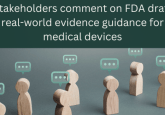FDA introduces the Oncology QCARD Initiative to facilitate review of real-world data studies

New FDA Oncology QCARD initiative defines key study design and data source elements for initial real-world data study proposals in order to facilitate sponsor–reviewer communication and introduce review efficiencies.
The US Food and Drug Administration (FDA) has recently announced it is instigating a venture termed the Oncology Quality, Characterization, and Assessment of Real-world Data (QCARD) Initiative. The initiative, developed by the FDA Oncology Center of Excellence (OCE) in collaboration with the Reagan-Udall Foundation, comprises evaluation and definition of a set of key study design and data source elements for sponsors to consider when assembling initial submissions for review of a proposed study and real-world data (RWD) source(s). The objectives of the Oncology QCARD initiative are to improve the quality of initial RWD study proposals, facilitate effective communication between study sponsors and FDA Oncology reviewers, and ultimately improve review efficiency for early RWD study proposals.
Use of real-world evidence (RWE) to evaluate safety and support evidence of effectiveness confers numerous benefits, such as increased diversity of patient representation, and has the potential to expedite the availability of safe and effective therapies. Consequently, the FDA reports submissions that incorporate use of RWD are rapidly increasing, particularly in the field of oncology.
“The cancer drug development community could benefit from an enhanced understanding of information needs that can facilitate the evaluation of initial RWD study proposals,” commented Donna Rivera and Paul Kluetz, respectively Associate Director for Pharmacoepidemiology and Deputy Director of the FDA Oncology Center of Excellence (OCE), in a FDA Voices article. “Our initial experience with oncology RWD submissions suggests that early proposals for studies incorporating RWD often lack basic elements of the study design and characterization of the data source to facilitate an appropriate evaluation from our review teams.”
The FDA OCE developed the QCARD Initiative in collaboration with the Reagan-Udall Foundation, with the goals of improving the quality of initial RWD study proposals, facilitating effective communication between study sponsors and protocol reviewers, and ultimately improving review efficiency for early RWD study proposals. The initiative, informed by input from an external group of epidemiology, biostatistics, clinical, and health services research experts, had three principal components:
- Reviewing the published literature, guidelines and guidances on RWD and dimensions of quality measurement.
- Engaging stakeholders and obtaining feedback on essential RWD study design elements and data characteristics.
- Defining key study and data elements to facilitate initial review of studies incorporating RWD.
Insights from the initiative have already been used by oncology review teams to inform requests for additional information when they have received RWD study proposals lacking sufficient information. FDA OCE has made the common data elements from those information requests available for sponsor awareness and consideration on their Oncology QCARD webpage, in order to share the lessons learned. This adds to the array of guidance regarding studies using RWE already published by the FDA and the Oncology Real World Evidence program.
A publication describing the Oncology QCARD initiative and methodological approach is in development. It is important to note that this FDA initiative is intended to improve the quality of initial study proposals and is not an evaluation of the quality of RWD submitted within a regulatory review. The OCE believes their approach of defining relevant data elements to facilitate review of initial RWD study proposals and introduce review efficiencies may be able to inform broader efforts across therapeutic areas.
You may also be interested in:
- 1st GetReal Institute Annual Conference: Deep dive into Session 4 – Collaborative use of real-world evidence for a better understanding of value in the US
- Rich Gliklich: Can you cast a critical eye on the state of RWE, and tell us from your perspective what are we doing well, and what needs to get better?
- Mark McClellan: What is going to be the impact of the Inflation Reduction Act on real-world evidence?






